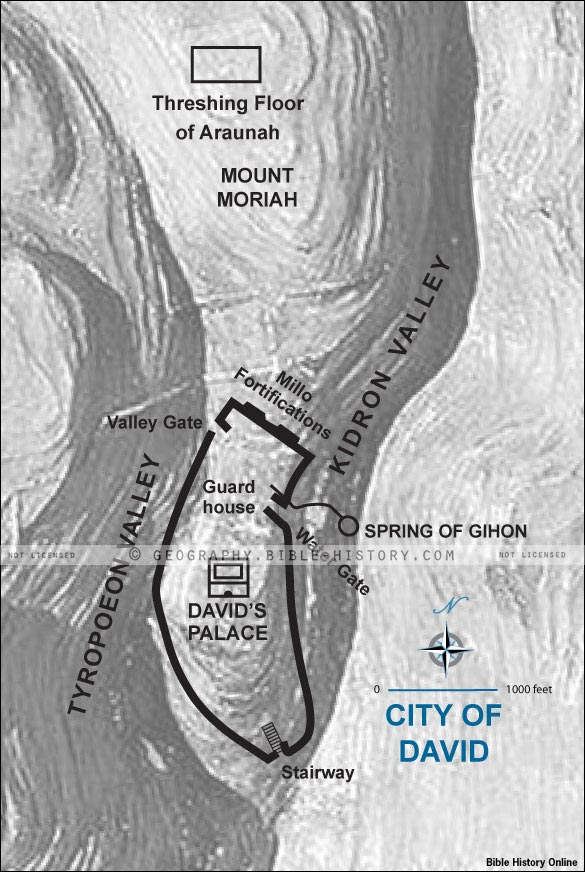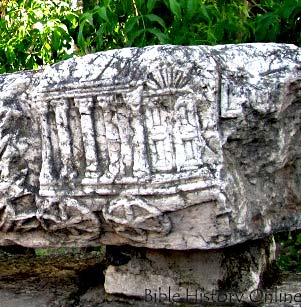2 Samuel 21 Background Information with Maps and Images (Picture Study Bible - 2 Samuel) Free Bible Online
2 Samuel 21
The Philistines had war again with Israel; and David went down, and his servants with him, and fought against the Philistines. David grew faint;
After this, that there was again war with the Philistines at Gob. Then Sibbecai the Hushathite killed Saph, who was of the sons of the giant.
Select a Chapter
-
2 Samuel 1 |
2 Samuel 2 |
2 Samuel 3 |
2 Samuel 4 |
2 Samuel 5 |
2 Samuel 6 |
2 Samuel 7 |
2 Samuel 8 |
2 Samuel 9 |
2 Samuel 10 |
2 Samuel 11 |
2 Samuel 12 |
2 Samuel 13 |
2 Samuel 14 |
2 Samuel 15 |
2 Samuel 16 |
2 Samuel 17 |
2 Samuel 18 |
2 Samuel 19 |
2 Samuel 20 |
2 Samuel 21 |
2 Samuel 22 |
2 Samuel 23 |
2 Samuel 24 |
Select a Book of the Bible
-
Genesis |
Exodus |
Leviticus |
Numbers |
Deuteronomy |
Joshua |
Judges |
Ruth |
1 Samuel |
2 Samuel |
1 Kings |
2 Kings |
1 Chronicles |
2 Chronicles |
Ezra |
Nehemiah |
Esther |
Job |
Psalms |
Proverbs |
Ecclesiastes |
Song of Solomon |
Isaiah |
Jeremiah |
Lamentations |
Ezekiel |
Daniel |
Hosea |
Joel |
Amos |
Obadiah |
Jonah |
Micah |
Nahum |
Habakkuk |
Zephaniah |
Haggai |
Zechariah |
Malachi |
Matthew |
Mark |
Luke |
John |
Acts |
Romans |
1 Corinthians |
2 Corinthians |
Galatians |
Ephesians |
Philippians |
Colossians |
1 Thessalonians |
2 Thessalonians |
1 Timothy |
2 Timothy |
Titus |
Philemon |
Hebrews |
James |
1 Peter |
2 Peter |
1 John |
2 John |
3 John |
Jude |
Revelation |
The Books of Samuel
2 Samuel 7:12 - And when thy days be fulfilled, and thou
shalt sleep with thy fathers, I will set up thy seed after thee,
which shall proceed out of thy bowels, and I will establish his
kingdom.
2 Samuel 7:13 - He shall build an house for my name, and I
will stablish the throne of his kingdom for ever.
2 samuel 7:14 - I will be his father, and he shall be my
son. If he commit iniquity, I will chasten him with the rod of
men, and with the stripes of the children of men:
2 Samuel 7:15 - But my mercy shall not depart away from him,
as I took [it] from Saul, whom I put away before thee.
2 Samuel 7:16 - And thine house and thy kingdom shall be
established for ever before thee: thy throne shall be
established for ever.
The Old Testament - A Brief Overview
Bible Survery - Samuel
Hebrew Name - Shemuel "asked of God"
Greek Name - Samoeul (Greek form of the Hebrew)
Author - Samuel (According to Tradition)
Date - From 1171-1015 BC Approximately
Theme of 1 Samuel - The beginning of the kingdom
Theme of 2 Samuel - David, God's chosen king
Types and Shadows - In Samuel Jesus is God's anointed King
Quick Reference Map

Map of Zion and the City of David (Click to Enlarge)
The original ancient Hebrew manuscripts recorded the books of Samuel as only one book. The first time these books were divided was in the Septuagint, the Greek version of the Hebrew Scriptures, and they were referred to as the First and Second Books of Kingdoms. 1 and 2 Kings were referred to as the Third and Fourth Books of Kingdoms. When looking closely at the King James version of the Bible the titles are still arranged in this way.
Samuel is the name of the books in the ancient Hebrew text, because he was the author and the main character in the early portions in the first book, and because of his role as a prophet of God known from Dan to Beersheba, who had anointed and had the biggest influence on the lives of King Saul and King David. The Lord raised up the prophet Samuel at a time in the history of Israel when they were disunited as a people and very determined to have a king reign over them. God made Samuel a great man, he was a Judge (1 Samuel 7:6, 15-17), and a Prophet (1 Samuel 3:20) and became God's chosen link between the periods of the Judges and the United Kingdom.
According to Jewish tradition the books were written by Samuel himself. They deal with the period in Jewish history from the time of Othniel the Judge through the reign of King David in the 11th and 10th centuries BC. This is of course one of the most important and significant times in the history of Israel, because their government changed from a system of tribes and judges to a kingdom by which the king would rule according to God's laws.
ARCHAEOLOGYArk Relief at Capernaum Synagogue
The ancient Ark of the covenant of Israel is one the most famous items in all of antiquity. There is no trace of the Ark of the covenant, yet it is memorialized by this Scripture block at the synagogue of Capernaum, created in Greco-Roman style. In the Bible the Ark of the Covenant was captured by the Philistines, and later returned because of sudden plagues that happened upon their lands. Through the valley of sorek it was taken back to Israel to Beth-shemesh.
Although there are a few repetitive content and accounts a clear outline is difficult, the contents of the two books may be outlined as follows:
Outline of the Books of Samuel
I. The Life of Samuel (1 Samuel 1-15)
1) The prayer of Hannah for a son, the granting of the request and the
subsequent dedication of the child Samuel to the service of the Lord (1 Samuel 1:1-2:
10).
2) The sin of the sons of Eli which resulted in their death and the loss of the
priesthood to the descendants of Eli (1 Samuel 2:12-36).
3) Samuel's vision concerning the house of Eli (1 Samuel 3).
4) The defeat of the Israelites and capture of the Ark by the Philistines and
the death of Eli (1 Samuel 4).
5) The Ark in Philistine territory (1 Samuel 5:1-7 :4).
6) The return of the Ark and the establishment of Samuel as a judge over Israel
(1 Samuel 7).
7) The appointment of Samuel's sons as judges and the consequent request for a
king. Samuel warns the Israelites of the perils of being ruled over by a king (1
Samuel 8).
8) Saul's meeting with Samuel (1 Samuel 9).
9) The anointing and election of Saul as king (1 Samuel 10-11).
10) Samuel's address to the people, in which he defends his own record and
exhorts them to walk in the way of the Lord (1 Samuel 12). From this time forward, he
serves as an adviser to the king.
II. The Reign of Saul (1 Samuel 13 - 2 Samuel 1)
1) The offering of sacrifice by Saul in Samuel's absence. This constituted
disobedience and resulted in God's disfavor toward Saul (1 Samuel 13).
2) Jonathan's rout of the Philistine army and his innocent breaking of Saul's
foolish vow (1 Samuel 14).
3) Saul's disobedience in sparing some of the Amalekites and their cattle (1
Samuel 15). Samuel's reply to Saul's feeble excuse was the familiar "to obey is better
than sacrifice and to hearken than the fat of rams" (1 Samuel 15:22 ).
4) The anointing of David to be Saul's successor (1 Samuel 16).
5) David and Goliath (1 Samuel 17).
6) The love of Jonathan and David and the marriage of the latter to the daughter
of Saul (1 Samuel 18). Also included in this chapter is the first attempt of the
jealous Saul to kill David.
7) Saul's second attempt on David's life (1 Samuel 19).
8) The parting of Jonathan and David (1 Samuel 20).
9) David's exile (1 Samuel 20-24).
10) The death of Samuel and the marriage of David to Abigail after the death of
her churlish husband, Nabal (1 Samuel 25).
11) The gradual eclipse of Saul's power as he futilely sought to destroy David
and protect his kingdom at the same time (1 Samuel 26-30).
III. The Reign of David (2 Samuel 2-25)
1) The proclamation of David as king at Hebron and his reign over Judah from
that place.
2) The removal of the capital to Jerusalem (2 Samuel 5).
3) The bringing of the ark to Jerusalem (2 Samuel 6).
4) David's victories (2 Samuel 7-11:1).
5) David's sin with Bathsheba and the rebuke by Nathan the prophet (2 Samuel 11-12).
6) The rape of Tamar by Amnon, the revenge of Absalom and Amnon's murder; the
flight of Absalom (2 Samuel 13).
7) Absalom's return, his efforts to usurp the throne of David and his death
(2 Samuel 14-18).
8) David's return and Sheba's revolt (2 Samuel 19-20 ).
9) The famine and the victory over the Philistines (2 Samuel 21).
10) David's thanksgiving and last words (2 Samuel 22-23:7).
11) The names and exploits of David's "mighty men" (2 Samuel 23:8-39).
12) The census and the resultant plague (2 Samuel 24).
Quick Reference Maps - 2 Samuel
Hebron
Mahanaim
Zion and the City of David
The Kidron Valley and David's City
2 Samuel Resources
The
Judges
Samuel
the Prophet
Saul,
Israel's First King
King
David
More About the Book of
1 Samuel
More About the Book of
2 Samuel
1 Samuel in the Picture
Study Bible
2 Samuel in the Picture
Study Bible
Timeline of the Ancient
World
Back to the Old Testament
Back to Bible
History Online
Bibliography Information
Free Bible Online - Picture Study Bible, King James Version. New York: American Bible Society: www.free-bible.com, 1995-2013. Bible History Picture Study Bible. Nov 01, 2024.
- King James Bible Home
- Free Bible Home Page
- Bible Encyclopedia (ISBE)
- Online Bible (KJV)
- Naves Topical Bible
- Smith's Bible Dictionary
- Easton's Bible Dictionary
- Fausset's Bible Dictionary
- Matthew Henry Bible Commentary
- Hitchcock's Bible Dictionary
Read The Bible
- 1599 Geneva Bible (GNV)
- 21st Century King James Version (KJ21)
- American Standard Version (ASV)
- Amplified Bible (AMP)
- Amplified Bible, Classic Edition (AMPC)
- Authorized (King James) Version (AKJV)
- BRG Bible (BRG)
- Christian Standard Bible (CSB)
- Common English Bible (CEB)
- Complete Jewish Bible (CJB)
- Contemporary English Version (CEV)
- Darby Translation (DARBY)
- Disciples’ Literal New Testament (DLNT)
- Douay-Rheims 1899 American Edition (DRA)
- Easy-to-Read Version (ERV)
- English Standard Version (ESV)
- English Standard Version Anglicised (ESVUK)
- Evangelical Heritage Version (EHV)
- Expanded Bible (EXB)
- GOD’S WORD Translation (GW)
- Good News Translation (GNT)
- Holman Christian Standard Bible (HCSB)
- International Children’s Bible (ICB)
- International Standard Version (ISV)
- J.B. Phillips New Testament (PHILLIPS)
- Jubilee Bible 2000 (JUB)
- King James Version (KJV)
- Lexham English Bible (LEB)
- Living Bible (TLB)
- Modern English Version (MEV)
- Mounce Reverse Interlinear New Testament (MOUNCE)
- Names of God Bible (NOG)
- New American Bible (Revised Edition) (NABRE)
- New American Standard Bible (NASB)
- New American Standard Bible 1995 (NASB1995)
- New Catholic Bible (NCB)
- New Century Version (NCV)
- New English Translation (NET)
- New International Reader's Version (NIRV)
- New International Version - UK (NIVUK)
- New International Version (NIV)
- New King James Version (NKJV)
- New Life Version (NLV)
- New Living Translation (NLT)
- New Matthew Bible (NMB)
- New Revised Standard Version (NRSV)
- New Revised Standard Version Catholic Edition (NRSVCE)
- New Revised Standard Version, Anglicised (NRSVA)
- New Revised Standard Version, Anglicised Catholic Edition (NRSVACE)
- New Testament for Everyone (NTE)
- Orthodox Jewish Bible (OJB)
- Revised Geneva Translation (RGT)
- Revised Standard Version (RSV)
- Revised Standard Version Catholic Edition (RSVCE)
- The Message (MSG)
- The Voice (VOICE)
- Tree of Life Version (TLV)
- World English Bible (WEB)
- Worldwide English (New Testament) (WE)
- Wycliffe Bible (WYC)
- Young's Literal Translation (YLT)
Table of Contents
Main Menu
- Ancient Assyrian Social Structure
- Ancient Babylonia
- Ancient Canaan During the Time of Joshua
- Ancient History Timeline
- Ancient Oil Lamps
- Antonia Fortress
- Archaeology of Ancient Assyria
- Assyria and Bible Prophecy
- Augustus Caesar
- Background Bible Study
- Bible
- Biblical Geography
- Fallen Empires - Archaeological Discoveries and the Bible
- First Century Jerusalem
- Glossary of Latin Words
- Herod Agrippa I
- Herod Antipas
- Herod the Great
- Herod's Temple
- High Priest's in New Testament Times
- Jewish Literature in New Testament Times
- Library collection
- Map of David's Kingdom
- Map of the Divided Kingdom - Israel and Judah
- Map of the Ministry of Jesus
- Matthew Henry Bible Commentary
- Messianic Prophecy
- Nero Caesar Emperor
- Online Bible Maps
- Paul's First Missionary Journey
- Paul's Second Missionary Journey
- Paul's Third Missionary Journey
- Pontius Pilate
- Questions About the Ancient World
- Tabernacle of Ancient Israel
- Tax Collectors in New Testament Times
- The Babylonian Captivity
- The Black Obelisk of Shalmaneser
- The Books of the New Testament
- The Court of the Gentiles
- The Court of the Women in the Temple
- The Destruction of Israel
- The Fall of Judah with Map
- The History Of Rome
- The Incredible Bible
- The Jewish Calendar in Ancient Hebrew History
- The Life of Jesus in Chronological Order
- The Life of Jesus in Harmony
- The Names of God
- The New Testament
- The Old Testament
- The Passion of the Christ
- The Pharisees
- The Sacred Year of Israel in New Testament Times
- The Samaritans
- The Scribes
Ancient Questions
- How did the ancient Greeks and Romans practice medicine and treat illnesses?
- What were the major contributions of ancient Babylon to mathematics and astronomy?
- How did the ancient Persians create and administer their vast empire?
- What were the cultural and artistic achievements of ancient India, particularly during the Gupta Empire?
- How did ancient civilizations like the Incas and Aztecs build their remarkable cities and structures?
- What were the major trade routes and trading practices of the ancient world?
- What was the role of slavery in ancient societies like Rome and Greece?
- How did the ancient Mayans develop their sophisticated calendar system?
- What were the key events and significance of the Battle of Thermopylae in ancient Greece?
- What was life like for women in ancient Rome?
Bible Study Questions
- The Authorized (King James) Version (AKJV): Historical Significance, Translation Methodology, and Lasting Impact
- Exploring the English Standard Version (ESV): Its Aspects, Comparisons, Impact on Biblical Studies, and Church Use
- A Detailed Historical Analysis of Language Updates in the KJ21: Comparison with Other Versions
- A Detailed Historical Analysis of the American Standard Version (ASV): Comparison to the King James Version, Influence on Later Translations, and Evaluation of Strengths and Weaknesses
- A Detailed Historical Analysis of Amplifications in the Amplified Bible (AMP) and Its Comparison to Other Bible Translations
- Detailed Historical Analysis of the Amplified Bible Classic Edition (AMPC): Examples of Amplifications and Comparative Analysis with Other Bible Translations
- Theological Implications of the BRG Bible's Color-Coding System: A Comparative Analysis
- The Christian Standard Bible (CSB): An In-Depth Analysis
- The Geneva Bible: Theological Distinctives, Impact on English Literature, and Role in Bible Translation History
- Exploring the Common English Bible (CEB): Translation Methodology, Church Use, and Comparative Analysis
About
Welcome to Free Bible: Unearthing the Past, Illuminating the Present! Step into a world where ancient history and biblical narratives intertwine, inviting you to explore the rich tapestry of human civilization.
Discover the captivating stories of forgotten empires, delve into the customs and cultures of our ancestors, and witness the remarkable findings unearthed by dedicated archaeologists.
Immerse yourself in a treasure trove of knowledge, where the past comes alive and illuminates our understanding of the present.
Join us on this extraordinary journey through time, where curiosity is rewarded and ancient mysteries await your exploration.
Recent posts
-

Halloween Mystery Boxes – Professional Tattoo Machines & Accessories by Vlad Blad Irons
This Halloween, Vlad Blad Irons is adding excitement and surprises for tattoo artists with their exclusive Halloween Mystery Boxes! Available only unt... -

Sports, Cybersport, and Betting: A Blend of Ancient Traditions and Modern Thrills
Sports had been a great a part of human records, supplying amusement, competition, or even non secular importance across cultures. Today, the rise of ... -

How to Remove Watermarks from Photos Using DeWatermark.AI
In ultra-modern digital age, pictures play a critical role in private and professional projects. Whether it is for social media, content material crea... -

Ethical Employee Monitoring: Alternatives to Screen Capture for Better Productivity
Screen monitoring has become a crucial component of today’s work environments, especially with remote and hybrid models on the rise. Many companies ... -

Revolutionize Your Investments with GPT Trading FX: AI-Powered Trading Platform
In the ever-evolving international of finance, GPT Trading FX stands on the intersection of modern-day generation and strategic monetary investment. B...



